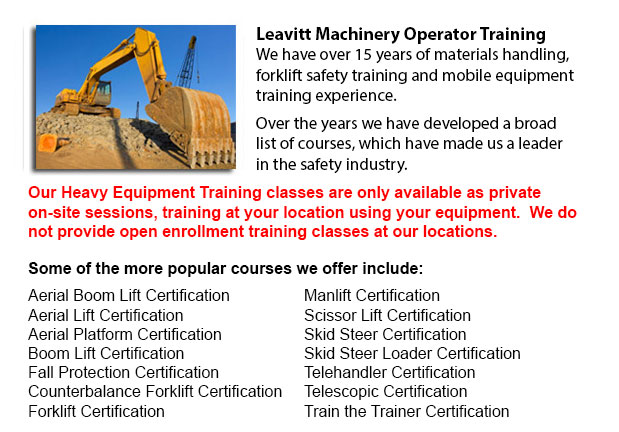
Saskatoon Heavy Equipment Training Courses - The initial step needed to take when choosing heavy equipment operator courses is determining the capacity you wish to work with heavy machinery. Like for instance, you could take courses that would teach you how to operate the machine or how to fix the equipment. Several choices are out there, be certain to align your career objectives and your research so you could determine which classes would be most appropriate for you. It is very important to select classes that are recognized and approved by the local governing bodies within your district.
The kinds of various heavy equipment certifications vary greatly. Most operator training courses would be particular to the kind of machinery you want to operate. Courses offered for crane operator certification would be different than the course offered for forklift certification. Crane certification will allow you to operate a crane safely, whereas the latter would allow you to deal with different kinds of materials handling machines. It is a good idea to check with your current employer before enrolling in whichever classes to make sure that the ones you pick would complete the training needs your employer has set out for you.
Heavy Equipment Operator Training
The heavy equipment operator courses would help the operator in acquiring the needed knowledge and skills they will need to enter the workforce as an entry level operator. In this twelve week course together with a practicum, you would focus on jobsite basics such as: safety, health and environmental awareness and training, machine operation and maintenance, and use of earth moving methods in hands-on conditions.
This training helps you to operate on chosen items of machines like for example a compactor, loader, grader, excavator and a dozer. There are several vital skills needed to become a heavy equipment operator: good problem solving skills, excellent oral communication skills, physical strength and stamina, good spatial ability and good vision, the ability to work well with others in a team or alone and good eye-hand coordination along with excellent manual dexterity.
Technical skills are likewise essential to operate these machines. These skills include: being able to operate equipment and power tools, general mechanical ability, knowledge of safe working procedures, the ability to follow technical specifications, grade plans and read instructions, the ability to make mathematical calculations and basic measurements, and the ability to perform basic maintenance and mechanical repairs.
-
Saskatoon Telehandler License
Saskatoon Telehandler License - The telescopic handler or telehandler is a frequently utilized machine in agricultural and industrial applications. This particular equipment is similar in appearance to a forklift and even functions in a similar way,... More -
Saskatoon Zoom Boom Ticket
Saskatoon Zoom Boom Ticket - Zoom Boom Training focuses on correctly training prospective operators on variable reach forklifts. The training objectives consist of gaining the knowledge of the machine's physics and to define the job of the operator.... More -
Saskatoon Forklift Operator Training
Saskatoon Forklift Operator Training - In North America, lift truck operator training is needed in order to prevent workplace injuries and accidents. Particular lift truck training will be provided to offer forklift operators driver training. The saf... More -
Saskatoon Forklift Certification Schools
Saskatoon Forklift Certification Schools - Forklift Certification is mandatory in North America. Hence, forklift training programs are essential both for businesses and for individuals seeking jobs in industries as forklift operators. Forklift traini... More -
Saskatoon Telehandler Training Courses
Saskatoon Telehandler Training Courses - Employers are responsible for making certain that their operating personnel and supervisors are trained to work competently utilizing telehandler machines. The competence level of staff must be assessed. If de... More -
Saskatoon Boom Lift Training
Saskatoon Boom Lift Training - Aerial platforms or likewise known as elevated work platforms are devices that enable workers to perform tasks and duties at elevated heights that will not be otherwise accessible. There are many aerial lifts available... More -
Crane / Overhead Crane / Self-Erect Crane / Truck Mounted Crane / Hydraulic Cranes Training in Saskatoon
Overhead cranes are likewise referred to as bridge cranes. They are a type of crane which comprises a line and hook device that runs along a horizontal beam which runs along two widely separated rails. Several overhead cranes can be found within a lo... More -
Saskatoon Heavy Equipment Training Programs
Saskatoon Heavy Equipment Training Programs - At any given construction site, there are usually different types of machinery which are ready to be used. These light and heavy machinery require both operators to run them and mechanics to fix them. Tra... More

Forklift Certification Saskatoon
TOLL FREE: 1-888-254-6157
Saskatoon, Saskatchewan
forkliftcertificationsaskatoon.com
Email Us
About Us


